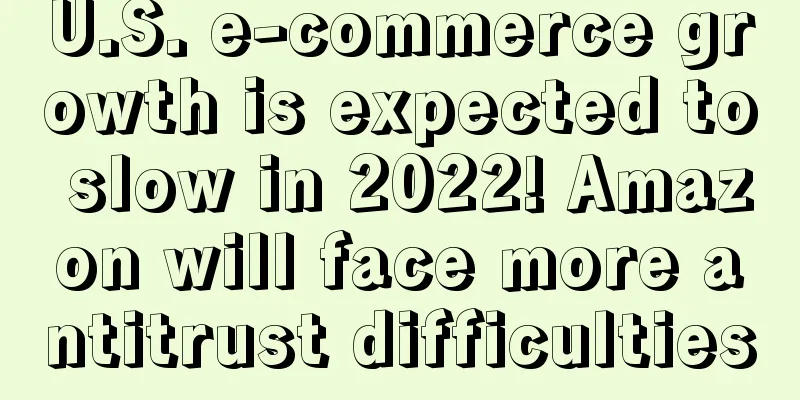U.S. e-commerce growth is expected to slow in 2022! Amazon will face more antitrust difficulties

|
It is learned that the Internet data analysis company DigitalCommerce360 recently released its forecast for the US e-commerce market in 2022, with highlights including the slowdown in e-commerce growth, the federal government's strengthening of Amazon's monopoly supervision, and inflation becoming the next hot issue. E-commerce growth slows According to the 2021 US e-commerce market report recently released by DigitalCommerce360, US online sales will increase by 16.2% year-on-year in 2021, but this is a slowdown compared to the year-on-year growth of 31.8% in 2020. DigitalCommerce360's research indicates that the growth rate of the U.S. e-commerce market will continue to normalize in 2022. The report states: "Everything is slowing down, and this situation will continue. In 2022, U.S. online sales are expected to grow by about 14% year-on-year." Online retailers further venture into new business models DigitalCommerce360 reports that other changes U.S. online retailers will make in 2022 to win the competition are investing in new business models, such as launching their own marketplaces, selling used goods, or testing buyback/trade-in programs. Several top online retailers will enter the space in 2021, and the model is attractive to retailers who want to offer a wider variety of inventory without the responsibilities associated with sourcing. Especially given that many younger consumers are concerned about sustainable products and aversion to fast fashion, which is associated with negative environmental impacts and ethically questionable labor practices, retailers will turn to testing new business models designed to address some of these issues. Supply chain issues will improve DigitalCommerce360 predicts that supply chain problems in the U.S. e-commerce market will gradually improve in the second half of 2022, and factories and ports will gradually return to normal after the holidays, unless the new coronavirus makes a large-scale comeback. Inflation will become the new hot topic The U.S. is now experiencing its highest inflation in nearly 40 years. The consumer price index in November was 6.8% higher than a year earlier, likely reflecting increased supply chain costs and constraints. Inflation will impact the retail industry in a number of ways heading into 2022. Commodity price inflation leads to wage inflationary pressures, which could be disastrous for retailers who are already paying high prices to hire employees. Unless the economy falls into a recession, these higher prices are likely to remain. The wedding boom and Amazon's antitrust woes Other trends DigitalCommerce360 is watching for in 2022 are a wedding boom, more antitrust woes for Amazon. 2022 will be a year of wedding-related shopping, including formal wear. Moreover, 2022 may not be a very friendly year for Amazon. The Biden administration has assembled a team of anti-Amazon antitrust advocates who will try to curtail Amazon's power through legal challenges in 2022 that will continue long after Joe Biden leaves the White House. Editor ✎ Xiao Zhu/ Disclaimer: This article is copyrighted and may not be reproduced without permission. |
Recommend
What is a C79 file? C79 file review
The C79 document is a detailed list of import VAT ...
Increased by 3.5%! Amazon's multiple fee updates will take effect as early as next month
Amazon sellers, take note! As Amazon makes change...
21 product selection ideas and numerical references
Dear friends, product selection is the first key ...
What is PicMarkr? PicMarkr Review
PicMarkr is an online image watermarking tool that...
What is Jungle Scout? Jungle Scout Review
Jungle Scout can help sellers find Amazon products...
What is Lithium? Lithium Review
Lithium is an effective social media marketing too...
What is Kimstore? Kimstore Review
Kimstore claims to be the most popular one-stop sh...
Walmart reshuffles executives, international CEO to leave
It is learned that on August 16, the day before th...
USPS holiday package volume dropped by 1 billion pieces year-on-year! Suspected of being hit by supply chain!
The United States Postal Service (USPS) expects to...
2023 Back-to-School Shopping Survey: More than Half of Americans Will Spend More Than $100
According to a survey by market research firm Nume...
What is paypay? Paypay Review
PayPay is a mobile payment system in Japan that al...
What is KeyworX? KeyworX Review
Keyworx is a tool for tracking products based on k...
Amazon lifts ban! Sellers can freely choose logistics
Last month was Amazon's year-end Christmas pe...
A large number of products have been removed from the shelves! Amazon is investigating fake orders again!
This morning, a large number of sellers reported ...
Amazon announces IPI drops to 450, but still limits shipping quantity!
On August 16, 2020, Amazon adjusted the inventory ...









